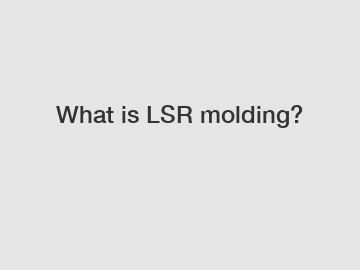What is LSR molding?
What is LSR Molding? The Benefits and Applications.
In the world of manufacturing and production, processes are constantly evolving to meet the demands of various industries. One such process that has gained popularity in recent years is LSR molding. LSR stands for Liquid Silicone Rubber, which refers to a type of material used in injection molding applications. LSR molding offers numerous advantages over traditional molding methods and can be found in a wide range of products across various sectors. In this article, we will explore what LSR molding is, its benefits, and its applications.
LSR molding is an injection molding process that involves the use of liquid silicone rubber as the material. Liquid silicone rubber is a durable and flexible substance that can withstand extreme temperatures, making it an ideal choice for a variety of applications. The process begins by combining two liquid compounds, a silicone polymer and a crosslinker, which are then injected into a mold cavity. The mixture is heated and cured, resulting in a solid and precise end product.

Advantages of LSR Molding.
1. Design Flexibility: LSR molding allows for complex shapes and intricate designs that would be difficult to achieve with traditional molding methods. The liquid nature of the silicone rubber enables it to flow into tight spaces and reproduce intricate details, resulting in high-precision products.
2. Material Properties: LSR offers a wide range of material properties, such as high tensile strength, excellent tear resistance, low compression set, and resistance to chemicals, UV rays, and extreme temperatures. These properties make LSR an excellent choice for products that require durability and longevity.
3. Cost-Efficiency: While LSR molding may have higher tooling costs compared to other molding processes, it offers long-term cost savings. The high-quality and durability of LSR products reduce the need for frequent replacements or repairs, resulting in reduced production costs in the long run.
Applications of LSR Molding.
1. Medical and Healthcare: LSR molding is extensively used in the medical and healthcare industries due to its biocompatibility and sterilization capabilities. It is commonly found in devices such as pacemaker components, surgical instruments, medical tubing, and prosthetics.
2. Automotive: LSR molded components are prevalent in the automotive industry due to their excellent heat resistance and durability. They are used in applications such as gaskets, seals, connectors, lighting, and sensor housings.
3. Electronics: LSR molding finds applications in the electronics industry for producing components such as connectors, keypads, seals, and insulators. Its resistance to heat, chemicals, and moisture makes it an ideal choice for these applications.
4. Consumer Goods: LSR molding is widely used in the production of consumer goods such as kitchenware, baby products, toys, and personal care items. Its flexibility, durability, and safety make it a preferred material for these products.
Concluding Remarks.
LSR molding has revolutionized the manufacturing industry by offering a versatile and reliable method for producing high-quality products. Its design flexibility, material properties, and cost-efficiency make it an attractive choice for various industries. From medical devices to automotive components and consumer goods, LSR molding finds applications in diverse sectors. As industries continue to evolve, LSR molding will likely play a crucial role in meeting the demands for innovative and efficient manufacturing processes.
If you are interested in exploring the possibilities of LSR molding for your product or have any further inquiries, please do not hesitate to contact us. Our team of experts is ready to assist you in realizing your vision using this advanced molding technique.
For more information, please visit dispensing closure, dispensing closure, dispensing closure.

Comments